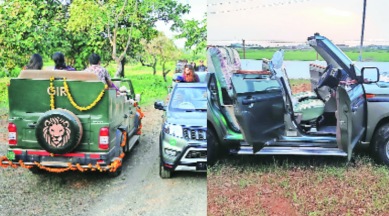Stay updated with the latest - Click here to follow us on Instagram
Boleros replace Gypsies; jungle safari at Gir gets an upgrade as forest dept ushers in new season
The 100 new Bolero Neo SUVs will replace 15-year-old end-of-life Maruti Gypsies, forest officers said.

As the Gir National Park and Wildlife Sanctuary (GNPWLS) reopened to tourists Monday after a four-month-long monsoon break, 70 modified Bolero Neo SUVs awaited tourists at the sanctuary headquarters in Sasan village inside Gir forest in Junagadh.
The 100 new Bolero Neo SUVs will replace 15-year-old end-of-life Maruti Gypsies, forest officers said. With this, the Gujarat forest department has initiated a major upgrade of tourism facilities and services of Gir Jungle Safaris, popularly called lion safaris.
According to forest officials, in addition to the six-seater, petrol-powered Maruti Gypsies, two more categories of vehicles — the six-seater Bolero Neo SUVs that have been modified as open-body safari vehicles as well as eight-seater safari vehicles — have been available to tourists from Monday.
Khimji Sandera, president of Gypsy Owners Association (GOA), Sasan expressed hope that the new vehicles will enhance tourist comfort while addressing environmental concerns. “These SUVs have better suspension systems that will make safaris more comfortable for tourists. As these new vehicles have BS-VI engines, they will not cause much pollution,” said Sandera, adding, “We will be able to register the new vehicles as taxis and get attendant benefits while also saving on maintenance cost.” He added that each new modified SUV costs around Rs 14 lakh.
Soon, a fourth option — four-seater vehicles — will also be made available, according to officials. The rates for booking the vehicles for safaris will be Rs 2,000 for Gypsies, Rs 3,500 for six-seater SUVs, Rs 4,500 for eight-seater SUVs and Rs 2500 for four-seaters, they said. Similarly, the Bolero SUVs, which are powered by diesel engines but have BS-VI engines instead of the BS-IV-powered Gypsies, will also be available for safaris inside Devaliya safari park at Rs 2,500 per trip. Officers said that plans are afoot to make the four-seater vehicles available in Devaliya also.
All the safari vehicles in Gir have been registered with the Gujarat State Lion Conservation Society (GSLCS), a body functioning under the forest department. GSLCS authorises vehicles owned by Sasan residents, a small village inside Gir, as safari vehicles and allots them tourists on a rotation basis, in turn, helping the village residents earn their livelihood.
GSLCS, which spends tourism revenue on conservation of the endangered Asiatic lions, has also decided to make available naturalists as well as English-speaking guides available to tourists. They will be in addition to the current lot of guides, consisting of youths from local villages. While both naturalists and G1 category guides can communicate with tourists in English, Hindi and Gujarati, what sets the former apart is their knowledge of the Gir ecosystem. G2 category guides would guide tourists in Gujarati and Hindi. Currently, the guide fee is Rs 400, but officers say it will be in the range of Rs 400 to Rs 750 after the upgrade.
Further, GSLCS has decided to register 90 more private-owned vehicles for safaris inside the Devaliya park near Sasan. “Unlike the Gir sanctuary, inside which Gir Jungle Safaris are organised from October 16 to June 15, Devalya safari park remains open to tourists round the year,” Aradhna Sahu, chief conservator of forests (CCF) of Junagadh wildlife circle and ex-officio member secretary of GSLCS, told The Indian Express. Gir forest falls in the jurisdiction of Junagadh wildlife circle.
Currently, there are 70 private-owned registered safari vehicles, in addition to the forest department buses for Devaliya. With 90 more, the number of private registered vehicles at Devaliya will go up to 160. The new vehicles to be added will be modified Bolero Neos modified SUVs and other four-seater vehicles, officers said. Similarly, 191 other registered private vehicles have been authorised to take tourists on jungle safaris inside the Gir forest. The current fleet of 262 safari vehicles are owned by Sasan residents.
“There were complaints from surrounding villages that only one village is benefiting from tourism. Therefore, as approved by the chief wildlife warden of Gujarat, we have decided to add 90 more vehicles from surrounding villages to the list of registered vehicles,” Sahu said, adding each of the 18 villages falling in the five-kilometre radius of Devaliya safari park have been permitted to get five vehicles registered for safaris.
According to Sasan DCF Mohan Ram, the forest department is not making ecotourism “costly” but just “repackaging” services. “We are not making Gir Jungle Safaris costly as we are not increasing the entry permit fee. We are merely repackaging tourism services to cater to the needs of different types of tourists,” said Ram, adding, “Last year, around eight lakh tourists visited Gir. Tourist flow was at an all time-high. In their feedback, many tourists had demanded a new system and we have responded (accordingly).”
Currently, GSLCS issues 150 permits for Gir Jungle Safaris on weekdays and 180 during weekends and festivals. It also issues 200 permits for safaris inside Devaliya. Permit fee for a group of up to six tourists for jungle safari and safaris inside Devaliya is Rs 800 on weekdays and Rs 1,000 during weekends and festivals.
Permit fee for children beyond the quota of six persons per permit is Rs 100 on weekdays and Rs 125 during weekends. Thus, a typical jungle safari in a gypsy costs Rs 3,200 on weekdays and Rs 3,400 during weekends and festivals.